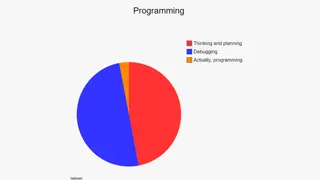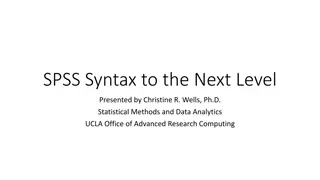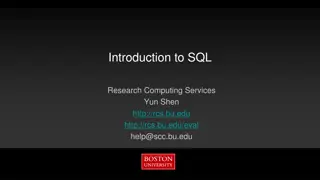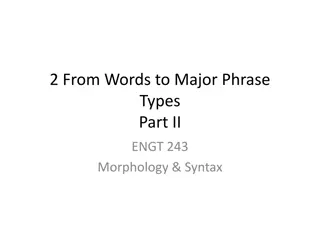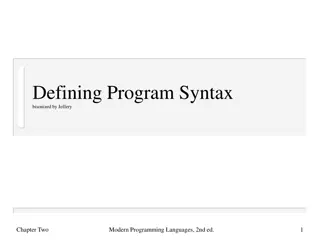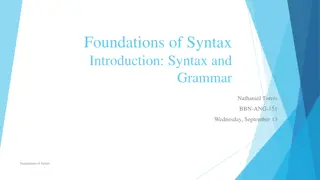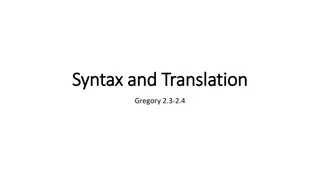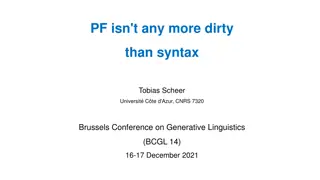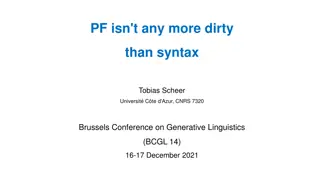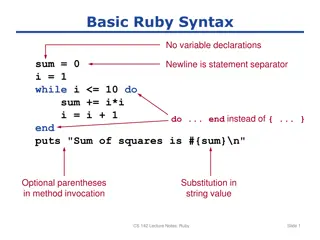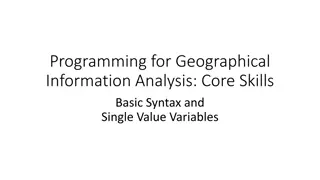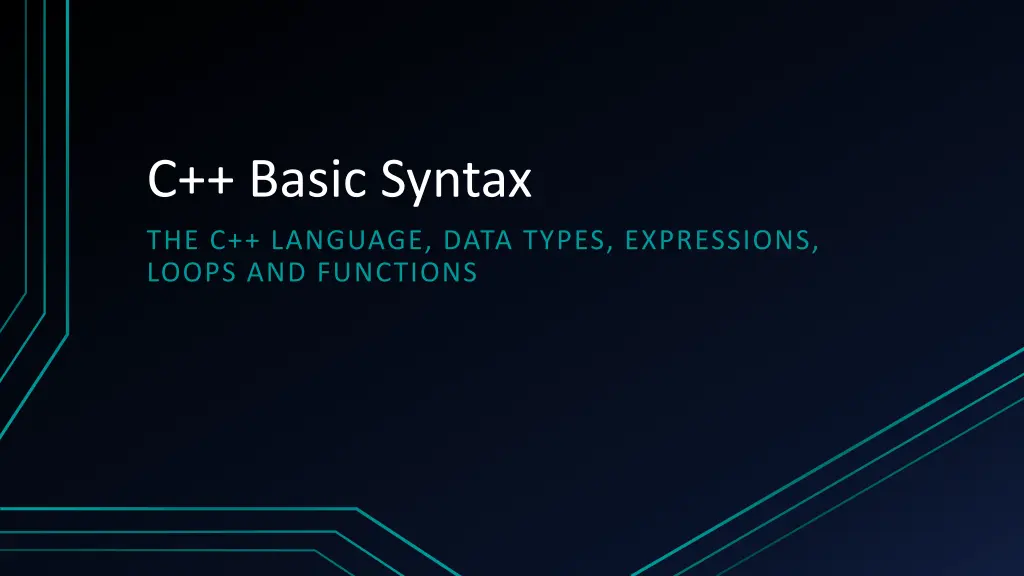
C++ Programming Language Overview
Learn about the C++ programming language, its history, philosophy, data types, expressions, loops, functions, and more. Discover why C++ is a fast, mid-level, multi-platform, and multi-paradigm language with a rich set of features. Explore the evolution of C++ standards and the importance of compilers and IDEs in C++ development.
Download Presentation

Please find below an Image/Link to download the presentation.
The content on the website is provided AS IS for your information and personal use only. It may not be sold, licensed, or shared on other websites without obtaining consent from the author. If you encounter any issues during the download, it is possible that the publisher has removed the file from their server.
You are allowed to download the files provided on this website for personal or commercial use, subject to the condition that they are used lawfully. All files are the property of their respective owners.
The content on the website is provided AS IS for your information and personal use only. It may not be sold, licensed, or shared on other websites without obtaining consent from the author.
E N D
Presentation Transcript
C++ Basic Syntax THE C++ LANGUAGE, DATA TYPES, EXPRESSIONS, LOOPS AND FUNCTIONS
Table of Contents History, Concepts & Philosophy, Standards C++ Program Structure, Compiling & Running C++ Code Primitive Data Types in C++ Declaring & Initializing Variables, Scope Operators, Expressions, Conditionals, Loops Functions Basic Console I/O 2
What is C++ FAST, MID-LEVEL, MULTI-PLATFORM, MULTI-PARADIGM
What is C++? General purpose programming language Compiles to binary Multi-platform, but underlying features may differ between systems Statically typed data in predefined forms (data types) Multi-paradigm Fast 4
C++ Philosophy Features immediately useful in the real world Programmers free to pick their own style Useful features more important than preventing misuse Features you do not use, you do not pay for Programmer can specify undefined behavior More: en.wikipedia.org/wiki/C++#Philosophy 5
No, not this guy, sorry C++ HISTORY Created 1979 1983 by Bjarne 6
Psst! Hey, kids, want some Classes? This one. See, much better! C++ HISTORY Created 1979 1983 by Bjarne Stroustrup Originally C with Classes 7
C++ Standards C++ 98 first standardized C++ version Still massively used today C++ 03 minor revision of 98, bug-fixes C++ 11 major revision Many new features and improvements Initializer lists, Rvalue references, lambdas, range-based loops, etc. C++ 14 latest official revision Small features and fixes Binary literals, variable templates, more type deduction, etc. 8
C++ Compilers & IDEs A C++ compiler turns C++ code to assembly i.e. translates C++ to machine language An IDE is software assisting programming Has a Compiler, Linker, Debugger, Code Editor Code organization, Tools, Diagnostics There are lots of C++ compilers and IDEs Free, open-source, proprietary 9
Code::Blocks Free C & C++ IDE Comes with MinGW GCC compiler C++11 support needs to be enabled from settings C++14 support needs more complicated setting to enable Lightweight Can compile single .cpp file Can be used for bigger projects with many files, references, etc. We will start the with Code::Blocks and show other IDEs later 10
C++ Program Structure, Compiling & Running C++ ENTRY POINT, COMPILERS & IDES
Hello World Include the input- output library Say we re working with std namespace (so we don t write std:: in front of everything) Here s a classic C++ Hello World example 1 #include <iostream> 2 using namespace std; 3 4 int main(int argc, char * argv[]) { 5 cout << "Hello World!" << endl; 6 return 0; 7 } Parameters in these brackets are optional Print to the console "main" function our entry point For main, 0 means everything went ok, terminating normally 12
C++ Entry Point & Termination The main function entry point of the program No other function can be named "main" C++ needs specific function to start from Everything else is free-form code ordering, namings, etc. Can receive command line parameters Termination main finishes (returns), the program stops The return value of main is the "exit code 0 means no errors informative, not obligatory 13
Program Structure: Including Libraries C++ has a lot of functionality in its standard code libraries C++ can also use functionality from user-built code libraries Say what libraries to use with the #include syntax For now, for standard libraries: put the library name in <> 1 #include <iostream> 2 using namespace std; 3 4 int main(int argc, char * argv[]) { iostream contains console I/O functionality 14
Program Structure: Blocks Basic building block (pun intended) of a program Most actual program code is in blocks, aka bodies Start with { and end with }, can be nested Functions (like main()), loops & conditionals code is in blocks 4 5 5 cout << "Hello World!" << endl; 6 return 0; 7 } int main(int argc, char * argv[]) { main() code block 15
Program Structure: Statements & Comments Statement: a piece of code to be executed Blocks consist of statements Statements contain C++ code and end with a ; A statement 4 5 5 cout << "Hello World!" << endl; 6 return 0; 7 } int main(int argc, char * argv[]) { Another statement (Note: usually 1 per line) C++ has comments (parts of the code ignored by compiler) // comments out an entire line, /* starts a multi-line comment, */ ends it 16
C++ Hello World LIVE DEMO
Variables & Primitive Types INTEGERS, FLOATING-POINT, CHARACTERS, VARIABLE DECLARATION, INITIALIZATION, SCOPE
Fast Intro: Declaring and Initializing Variables <data_type> <identifier> [= <initialization>]; Declaring: int num; Initializing: num = 5; Combined: int num = 5, and additionally int num(5); Can declare multiple of same type by separating with comma (,) int numGlobal; int main() { int num; num = 5; int sameNum(5); return 0; } int trappist1BMassPct=85, trappist1CMassPct=80; is valid NOTE: int num() is not a default initialization it s a function declaration. 19
Declaring & Initializing Variables LIVE DEMO
TIMES UP! TIME: Quick Quiz: Tony gives George 5 apples Later, Angus gives George 3 apples How many apples does George have? 21
C++ PITFALL: UNINITIALIZED LOCALS George has 13837 apples. Why? Nobody said George had 0 apples to begin with. 22
Uninitialized Locals LIVE DEMO
Local & Global Variables Global: defined outside blocks, usable from all code Local: defined inside blocks, usable only from code in their block Locals DO NOT get initialized automatically Globals get initialized to their default value (0 for numerics) int secondsInMinute = 60; int minutesInHour = 60; int hoursInDay = 24; int secondsInHour = secondsInMinute * minutesInHour; int main() { int days = 3; int totalSeconds = days * hoursInDay * secondsInHour; 24
Global & Local Variables LIVE DEMO
const Variables C++ supports constants variables that can t change value Can and MUST receive a value at initialization, nowhere else Can be local, can be global secondsInMinute, minutesInHour, etc., aren t things that normally change in the real world the following won t compile: const int secondsInMinute = 60; int main() { secondsInMinute = 13; //compilation error NOTE: the constkeyword has other uses which we ll discuss later on 26
const Variables LIVE DEMO Yes, I know that s not how that meme s used. Shut up.
Other variable modifiers static variables initialize once and exist throughout program Can be used to make a local variable that acts like a global one Can be global, but that s basically the same as a normal global variable We ll talk more about them later extern tells the compiler a variable exists somewhere in a multi- file project Will discuss this in another lecture register is a hint to compiler where to store the variable Mostly redundant these days 28
Primitive Data Types REPRESENTING INTEGER, FLOATING-POINT AND SYMBOLIC VALUES
Integer Types int C++ has only one integer type int Width modifiers control the type s size and sign short at least 16 bits; long at least 32 bits long long 64 bits (C++11, Windows supports it on C++03 too) signed and unsigned control whether memory used for sign data Modifiers can be written in any order int can be omitted if any modifier is present Defaults: int usually means signed long int 30
Integer Sizes and Ranges The C++ standard doesn t have very strict size guarantees Depends on implementation, but int is 32-bits on most mainstream PCs Use the sizeof(int) operator to get the size (in bytes) on your system Ranges depend on size, a 32-bit integer has about 4 billion values So, a signed 32-bit integer has the range of about (-2 billion, +2 billion) Average human lifespan is about 2 billion seconds. int is older than you! Sizes: http://en.cppreference.com/w/cpp/language/types#Properties Ranges: http://en.cppreference.com/w/cpp/language/types#Range_of_values 31
Integer Types LIVE DEMO
Floating-Point Types Represent real numbers (approximations) 2.3, 0.7, -Infinity, -1452342.2313, NaN, etc. float: single-precision floating point, usually IEEE-754 32-bit double: double-precision floating point, usually IEEE-754 64-bit Name Description Size* Range* 1.5 10 45 to 3.4 1038 (~7 digits) float Floating point number. 4bytes Double precision floating point number. 5.0 10 324 to 1.7 10308 (~15 digits) double 8bytes Long double precision floating point number. 5.0 10 324 to 1.7 10308 (~15 digits) long double 8bytes 33
Using Floating-Point Types LIVE DEMO
Guaranteeing Type Sizes C++ has some tentative cross-platform support for fixed-size types There is the C++11 bitset, the cstdint library, etc. Code running on most systems has access to system macros E.g. on Windows: INT32, INT8, FLOAT, INT_PTR, LONG_PTR If you know the system, you can use those macros to guarantee size Universally-portable code with fixed type sizes is not really possible Do you really expect a toaster to guarantee a 64-bit integer? In most cases, type-size guarantees are not necessary 35
char NO, NOT THIS CHAR THE C++ CHARACTER TYPE 36
Character Types char char is the basic character type in C++ Basically an integer interpreted as a symbol from ASCII Guaranteed to be 1 byte a range of 256 values Initialized by either a character literal or a number (ASCII code) int main() { char letter = 'a'; char sameLetter = 97; char sameLetterAgain = 'b' - 1; cout << letter << sameLetter << sameLetterAgain << endl; return 0; } 37
Using char as a Number char is essentially a 1-byte integer, it can be used as such char is also useful when processing data byte-by-byte Always use signed or unsigned when using char as a number Guarantees the range of char as [-128, 127] or [0, 255] respectively Otherwise the system picks whatever it thinks is best for character representation you don t want the system pretending to be smart Avoid using char as a number unless you have a good reason to 38
Using Character Types LIVE DEMO
Boolean Type bool bool a value which is either true or false, takes up 1 byte Takes true, false, or numeric values Any non-zero numeric value is interpreted as true Zero is interpreted as false int main() { bool initializedWithKeyword = true; bool initializedWithKeywordCtor(false); bool initializedWithZero = 0; bool initializedWithNegativeNumber(-13); 40
Using bool LIVE DEMO
Rules for C++ Identifiers We ve been declaring variables using some rules Variable names are a type of identifier Data types, functions, classes, etc. are identifiers Allowed symbols: alphabetic characters, digits, underscores Can t begin with a digit Case-sensitive Can t be a reserved C++ keyword (like int, return, true, etc.) 42
Implicit & Explicit Casting Types which fit into others can be assigned to them implicitly For integer types, fit usually means requiring less bytes E.g. char a = a ; int i = a; is a valid operation But int i = 97; char a = i; is not For floating point, float fits into double If you really want to store a bigger type in a smaller type: Explicitly cast the bigger type to the smaller type: smallType smallVar = (smallType) bigVar; Can lose accuracy if value can t be represented in smaller type 43
Expressions, Operators, Conditionals, Loops, LITERALS, IF, SWITCH, ELSE, FOR, WHILE,
C++ Literals Represent values in code, match the primitive data types Integer literals Value in a numeral system decimal, octal, hex, and binary (C++11) Suffix to describe sign and width (like the int modifiers) Floating-point literals Digit sequence decimal OR exponential notation Suffix to describe precision (single or double-precision) 45
C++ Non-Numeric Literals Character literals letters surrounded by apostrophe ( ) String literals a sequence of letters surrounded by quotes ( ) That s what we used to print Hello World! Boolean literals true and false 46
C++ Literals Things to Keep in Mind Integers are positive writing a - does a minus operation Integers should be suffixed if they are too large for a simple int Compiler might try to extend automatically, but don t rely on it Floating-points are double by default, suffix with f for float Note: there are also string literals discussed in another lecture #include<iostream> using namespace std; int main() { cout << -42 << " " << 052 << " " << 0x2a << " " << 0x2A << endl << 0.42 << " " << .42f << " " << 42e-2 << endl; } 47
C++ Literals LIVE DEMO
Expressions and Operators C++ operators and expressions are similar to other languages Operators: Perform actions on one or more variables/literals Can be customized for different behavior based on data type C++ operator precedence and associativity table: http://en.cppreference.com/w/cpp/language/operator_precedence Don t memorize. Use brackets and look up precedence when necessary Expressions: literals/variables combined with operators/functions 49
Commonly Used C++ Operators Category Arithmetic Logical Binary Comparison Assignment String concatenation Other Operators + - * / % ++ -- && || ^ ! & | ^ ~ << >> == != < > <= >= = += -= *= /= %= &= |= ^= <<= >>= + . [] () a?b:c new delete * -> :: (type) << >> 50


